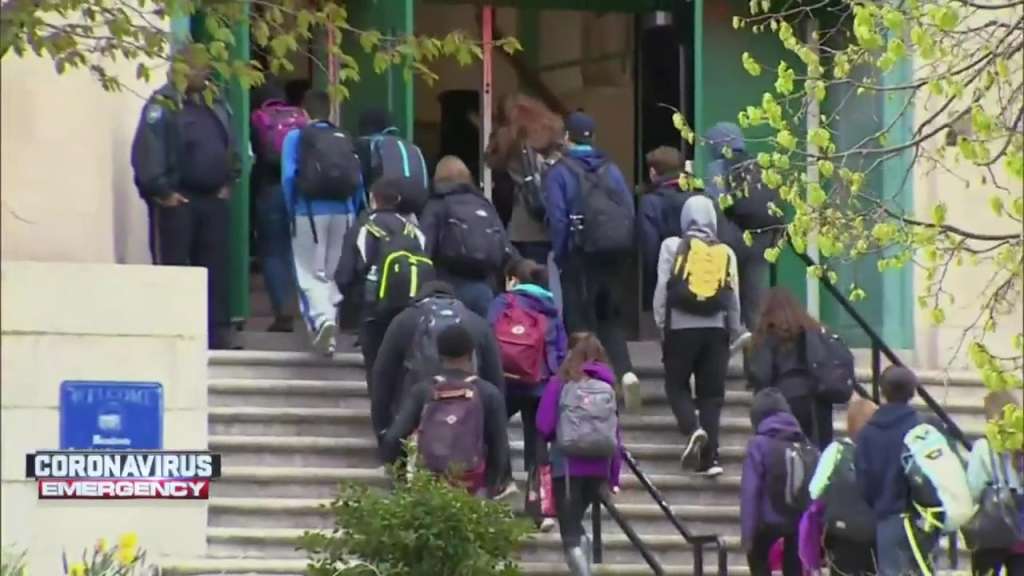(CNN) — Americans have seen a wave of reopenings and the relaxation of restrictions as more people get vaccinated, but experts are warning the public not to get complacent if the return to normal is to continue.
And if some communities continue to see high levels of Covid-19 infections, children under 12 in those areas will likely still have to wear masks next school year, Dr. Anthony Fauci told NBC Nightly News.
The CDC considers a county to have “high” transmission if there have been 100 or more cases of Covid-19 per 100,000 residents or a test positivity rate of 10% or higher in the past seven days.
So far, more than half of the population has gotten at least one dose of vaccine and 12 states have reached President Joe Biden’s goal of having 70% of US adults getting at least one dose by July 4.
As vaccinations have gone up, cases of the virus have gone down. Ensemble forecasts published Wednesday by the US Centers for Disease Control and Prevention project that newly reported Covid-19 cases, hospitalizations and deaths will likely continue to decrease over the next four weeks.
Current vaccination rates have begun tapering off — and are now less than a third of the peak pace of about 3.3 million per day in April. But the July 4 goal is still realistic — if people don’t get complacent that is, Fauci told NBC News.
CNN medical analyst Leana Wen warned that after Memorial Day weekend, the US is still two weeks away from seeing the results of its first stress test, given that almost half of the country remains unvaccinated.
Even if cases plateau or taper off from their current falling rate, Wen said she worries some communities will remain vulnerable.
“You have parts of the country with very low vaccination rates,” she said. “I really worry about the unvaccinated people in those areas spreading coronavirus to one another.”
Fauci also said he’s worried about communities that are experiencing high levels of spread. He told NBC News that it is too early to lift mask mandates in those areas.
“If you pull back on masking, then you’re going to wind up having a danger of peaking again,” he said.
New York City offering vaccinations in schools
Now that vaccines are available for children as young as 12-years-old, New York City will begin offering in-school vaccinations for kids 12-17, Mayor Bill de Blasio announced Wednesday.
The program will start at four schools in the Bronx on Friday and will eventually expand to all five boroughs in the next few weeks. The city is partnering with UFT, a labor union that represents most teachers in the NYC public school system, to get as many kids vaccinated before the school year ends later this month, de Blasio said.
Currently, around 118,000 New York City kids aged 12 through 17 have been vaccinated, comprising about 23% of the city’s kids in that age range, de Blasio said.
After more than a year learning remotely, many people are eager to make schools a safe place for their students to return.
Studies are underway in hopes of making a vaccine available to children as young as 6 months. These trials may still take months in order to ensure the doses are safe and efficacious.
More vaccinations are an uphill battle
Significant mitigation strategies may be needed in areas where there is large-scale, community transmission, the CDC said, including in communal settings, like schools and workplaces.
As well as masks and social distancing, widespread vaccinations are key to reducing transmission, experts have said.
But after a quick surge of eager participants, the remainder are those who have often received false information about their safety or who lack access.
As a result, the road to vaccinating the rest of the population may be an uphill battle from here on out, the US Surgeon General Dr. Vivek Murthy said Wednesday, but “we’re not giving up.”
“Because we had so much success early on, we are now getting to the part of the campaign which is tougher,” Murthy said “We’ve got to look further, if you will — convince more people, get to the right information, increase access even further.”
The early success is helpful in keeping large swaths of the nation protected — but reaching the levels that will stop community spread will take a change in strategy, Murthy said.
“This is a multi-pronged campaign recognizing that people have different reasons that they’re not vaccinated right now, but we have to work on all three fronts: mobilization, education and improving access,” said Murthy. “That’s how we’re going to get the nation vaccinated.”
(Copyright (c) 2024 CNN. All Rights Reserved. This material may not be published, broadcast, rewritten, or redistributed.)

